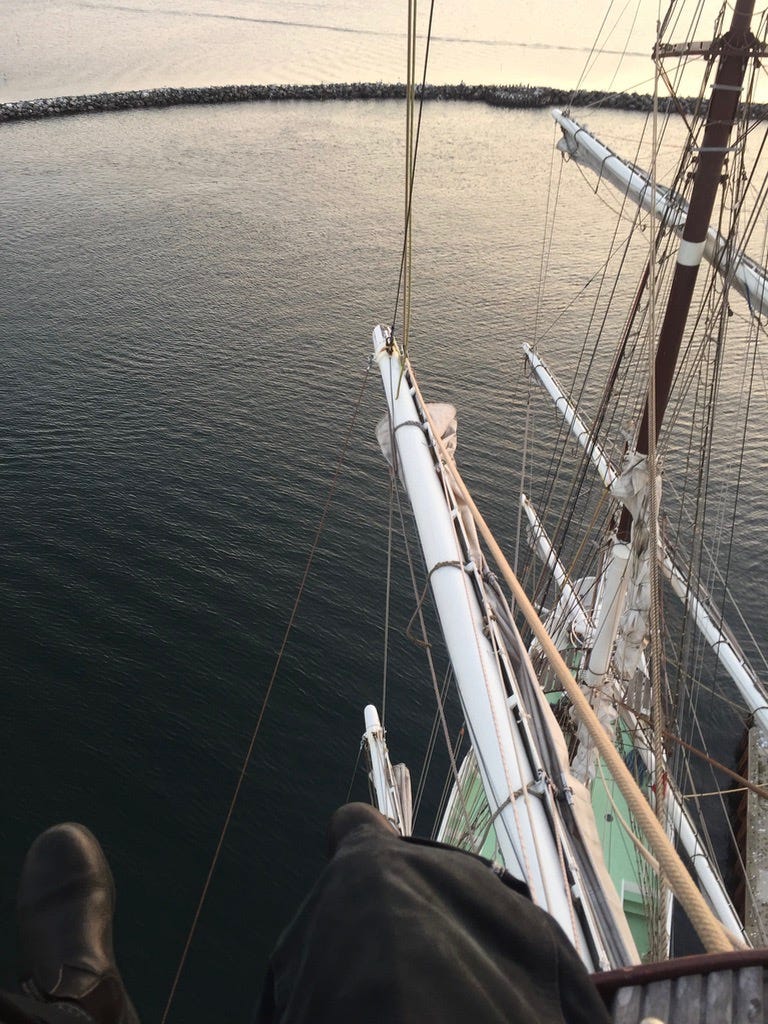heinke
Heinke the ships’ cook is a lean, laconic Dutchman with the slight stoop of self-conscious tall people and enormous, mournful eyes.
There are a lot of sea-stories about Heinke, all of them as wonderful as they are true: The Time Heinke Decided to Make Soup in a Beaufort 7 Gale (“The ship was flying all over the fucking place and heeling like crazy and there was Heinke with the soup pot hung over the burner with bungee cords, stirring away with a little smile on his face, and I said ‘Heinke what are you doing,’ and he said ‘I thought soup would be nice for a stormy day’”); The Time Heinke Caught the Oven in the Arctic (“We drive around a headland and a huge wave comes out of nowhere and knocks the ship sideways, and I hear a terrible noise from the galley and I run in and the whole oven full of breads has come flying out from the wall into Heinke’s arms, and there is Heinke, standing in the middle of the kitchen holding the oven, he looks a little sad, so I help him put the oven back in the wall and we clean up the breads with a dustpan and put them back in the oven and the guests have their breakfast on time”); The Time Heinke Caught the Microwave in the Baltic (“We drive around a headland and a huge wave comes out of nowhere and knocks the ship sideways, and I hear a terrible noise from the galley and I run in and there is Heinke, standing in the middle of the kitchen holding the microwave, which has come flying off the refrigerator into his arms, and he says, ‘Why must I always be catching ovens’”). I never saw a weather Heinke couldn’t cook through, placidly rigging sheet pans to sit flat in the oven when the ship is heeling sideways, strapping pots to the stove with bungee cords, humming to himself as he fries perfect egg after perfect egg when just outside the galley the guests are lurching about like drunk people, barely able to walk.
On the first day I worked with him Heinke asked me if I was vegetarian. “Mostly,” I said, “but don’t go out of your way for me.” Every day after that he made a special lunch and dinner just for me: baked Camemberts, roasted vegetables, vegan curries, salads and stir-fries and special pasta sauces. Every single day. One night he cooked steaks that looked so delicious I abstracted one and locked myself in the bathroom and ate it with my fingers. I couldn’t bear for him to catch me eating meat after all that work on my behalf.
Heinke does not tell heroic galley stories about himself unless he is prompted after a few beers, but he will tell you other stories on occasion, such as when it was his job to sell ice-creams from a cart at electronic music festivals, and he would go about with his ice-cream cart having the most wonderful conversations with people, and once a pretty girl came up to him crying and asked him to help her find her boyfriend, and he said “What does your boyfriend look like?” and she said “He has got a bald head and a tracksuit,” and Heinke said “Why, that’s everyone here! Why don’t you have an ice-cream first and then we can go and have a look,” and after she ate her ice-cream he took her around the electronic music festival. “And we found her boyfriend!” Heinke says, at the end of this story, with such delight that the habitually melancholy cast of his face is transformed.
Heinke gave me a lot of good advice about sailing. For example: one never makes pizzas in the first two days of a charter. Pizzas are fiddly. Sometimes there is a few minutes’ lag between when all the extant pizzas have been consumed and the next round of pizzas emerges from the oven, and if the guests are not yet acclimated to the fact that there will be more food at any given meal than an entire flotilla of guests could manage to consume they may become restive. By the third day they are better able to manage the anxiety of three to five unfed minutes, and it is safe to cook pizzas. At this time Heinke allowed me to decorate several pizzas for the guests, which I understood to be the great honor that it was. Another thing Heinke taught me: don’t talk to the cook in the morning, ever. For any reason. At all.
Once an ABBA song came on the galley radio and Heinke and I hummed along to it while he chopped onions and I washed dishes. Doooon’t—go—was-ting your e-mooooo-tion, lay all your love on me.
Some time later he said, “That was quite a good idea, actually,” and I said, “What was,” and he said, “To get four really good-looking people and have them make pop songs.”
“Oh,” I said. “Yes, it was.”
Heinke nodded pleasantly and went back to his chopping. We finished the shift in companionable silence.
Fig. 7
Hang in there.
Love,
Sarah


Sarah, I love it.